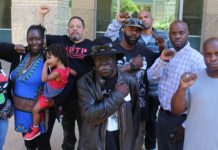
by Kwesi Damani Kojo Osundara
The First Amendment’s freedom of speech clause is one of the most commonly referenced constitutional rights that citizens possess. This right is one that America prides itself on and distinguishes the U.S. from other countries around the world, particularly those with dictatorial leadership. It is through this right that citizens can express their views and opinions, even those that are critical and disapproving of government and its agencies. Although this right indubitably extends to all citizens, employers and government agencies – especially departments of corrections – regularly interfere with the right to free speech.
There is plenty of case law from various federal circuits where the freedom of speech right exercised by employees and prisoners brought about retaliatory discipline. Whether the speech concerned policies and practices of the correctional facility or was simply satirical political writing, if it casts the department of corrections in a negative light, the speech must be suppressed, regardless of its veracity.
Having been a recent recipient of retaliation for political speech, I speak from experience, not some “us vs. them” conspiratorial delusion. While I am active in the fight for criminal justice reform and protection of prisoners’ civil rights, which would make me a member of team “us,” I have motivation derived from traditional Yoruba moral principles as opposed to the “us vs. them” antagonism.
While housed at the Richard A. Handlon Correctional Facility in Michigan, I wrote a memorandum encouraging prisoners to have their families go to the website http://sawarimi.org/archives/1775 to sign an online petition for the amendment of MCL § 800.33 which would have the effect of making all prisoners in Michigan eligible for Good Time sentence reductions. I submitted the memorandum through the National Lifers of America, Chapter 1030, to the facility’s deputy warden.
The following day I was told to pack up because I was being transferred to another facility. Probably just coincidence, right? Later that same day I was taken to segregation, after my property had been packed for the transfer, and soon after my arrival in the facility’s segregation unit I was taken to speak with the captain.
The captain had determined, because this website supposedly contained information about some prison riots and strikes taking place in other states, that I was attempting to incite riots and strikes, despite the content of the memo solely pertaining to the petition to bring back Good Time sentencing reductions. When I attempted to point out the obvious – prisoners don’t have access to the web, so how could content on a website incite them to riot – he conveniently equivocated.
When I asked, “Will I be released from segregation since I’ve done nothing wrong?” his response made it clear that this was more than an exaggerated security concern. He said, “Well, you wanna be all political, this is what happens.” It was clear that it wasn’t just this memo, either, as I had written several memos in the months prior concerning restoration of the Good Time sentence reductions. I was subsequently transferred to Lakeland Correctional Facility and held in segregation an additional four days, released without a hearing.
My situation is certainly not an isolated incident, in either the Michigan DOC or any other department of corrections. Many prisoners who understand that their convictions and conditions of confinement can be challenged – not only judicially, but legislatively – experience administrative attempts to silence them.
We are all undoubtedly political prisoners. We should make all prisoners realize that, whether or not they use their freedom of speech politically, they are also political prisoners – if for no other reason than that their convictions, duly convicted or not, become infrastructural to election campaigns of legislators and jurists in their ascension up the judicial and legislative branches.

Additionally, departments of corrections, when seeking more funding from the state for equipment or facility construction and renovations, use us to strengthen their requests, claiming the equipment is needed to protect themselves against us or to manage us. It seems the branches of government recognize the expediency of using us politically.
Yet there are too few of us who participate in politics. We need not cast a vote or run for public office to participate in politics. Many of us have access to people while incarcerated via JPay or Facebook, and that social capital, through our use of political speech, can become a powerful tool to us in carrying out our political agendas. This is how we participate in politics.
One might wonder, having read this article to this point, “How do I protect myself when the administration attempts to suppress my speech as they did yours?” We can protect ourselves through both the legislative and judicial branches.
In the judicial branch we have civil rights complaints we can file under Title 42 USC § 1983 in the federal district courts. Although we are incarcerated and have lost many constitutional rights as a result, the First Amendment freedom of speech is not one of the rights forfeited.
The Sixth Circuit, our federal circuit in Michigan and several other states, requires our speech to address matters of public concern, which is speech that can be “fairly considered as relating to any matters of political, social, or other concern to the community.” Some district courts in other circuits have held that statements by an inmate designed to urge a change in prison policy are deserving of First Amendment protection.
If you encounter some retaliation for your writing or words concerning matters of public concern, go through the grievance procedure to exhaust your remedies, then file your complaint. We all know power concedes nothing without a demand, and the MDOC is no exception to that rule. This is the most promising form of protection for us because it is only the occasional reprimand from the federal courts that makes the MDOC and other state DOCs respect our constitutional rights.
In the legislative branch, we have a lot more work to do to get protections for us. The end goal is electing public officials through voting blocs created by mobilizing our families and friends.
In addition to the mobilization of family and friends, our writing, the protected speech at issue, can be used to persuade other citizens, organizations and interest groups to vote for public officials and ballot initiatives that are pro-prison reform. This means that we’ll need activities contributing to the fight for prison reform to take precedence over reality TV, poker, chess and dominoes in the daily lives of prisoners.
The public officials who are proponents of prison reform, particularly the governor, can appoint an MDOC director that is also a proponent of prison reform and intolerant of civil rights violations from his/her subordinates. This MDOC director in turn appoints a grievance manager who is intolerant of staff misconduct, particularly the sort that rises to the level of constitutional violations, and this staff misconduct never, or infrequently, comes before a federal judge, wasting taxpayer money that could be spent in other state departments, namely education.
While this method yields greater benefits for us and the protection of our rights, the societal acceptance of the devaluation of prisoners’ lives and societal support for the brutal retributive justice system renders this approach improbable; therefore, it is less promising than the judicial approach.
The prisoners who were once the recklessly fearless warriors, utilizing these attributes in a criminal fashion, now refuse to channel that same energy in a productive manner to challenge the laws and policies that keep them incarcerated. Men who once terrorized neighborhoods now acquiesce to administrative policies and practices, regardless of the constitutionality of such practices and policies.
These men fear retaliation from prison administrators for speaking out against staff misconduct, verbal or written grievances, while in their lives before prison, they flirted with death regularly. This unwillingness to become active and use their speech to build voting blocs, endorse public officials for prison reform and ballot initiatives, is inexplicable.
It is my sincere hope that this article has an analeptic effect on those readers who currently aren’t active in the fight for prison reform and prisoner civil rights and cause them to contribute to the fight. I am confident there is a segment of the prison population, albeit small in number, who are soldiers in this cause.
I salute you all and consider you all brothers and comrades, whether we have met or not. I appreciate every syllable that you have written or spoken on behalf of prisoners.
We must continue to valiantly push for legislative changes to open the gates a bit more broadly, as others before have done for us. We enjoy rights today that others died in the past for us to have.
Even in enduring retaliatory misconducts, transfers and custody level changes – to assert and protect our rights should activate, not intimidate us. Those of us with literary or oratorical talent are obligated to use it as a political weapon. Let us exercise our First Amendment right and speak and write freely for legislative change.
Send our brother some love and light: Gerald Byrd, 682089, Lakeland Correctional Facility, 141 First St., Coldwater, MI 49036. Gerald (Kwesi) writes: “Please note that, if you would like to maintain correspondence, you will need to include a return address on the letter itself, as envelopes are discarded by mail room staff.”

 Store
Store









